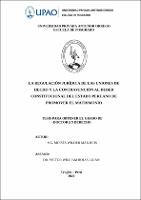Mostrar el registro sencillo del ítem
La regulación jurídica de las uniones de hecho y la contravención al deber constitucional del Estado peruano de promover el matrimonio
| dc.contributor.advisor | Rojas Lujan, Victor William | |
| dc.contributor.author | Max Rios, Moises Wilder | |
| dc.creator | Max Rios, Moises Wilder | |
| dc.date.accessioned | 2021-01-27T02:55:55Z | |
| dc.date.available | 2021-01-27T02:55:55Z | |
| dc.date.issued | 2021 | |
| dc.identifier.uri | https://hdl.handle.net/20.500.12759/7118 | |
| dc.description.abstract | El propósito del presente trabajo fue analizar las percepciones sobre la regulación jurídica de las uniones de hecho y la contravención al deber constitucional del Estado Peruano de promover el matrimonio que manejan los miembros de la comunidad jurídica de La Libertad, 2020. La investigación fue cuantitativa y aplicada, y se basó en el método hipotético – deductivo, que fue complementado con el método histórico – jurídico. El diseño fue no experimental y transeccional. El nivel fue descriptivo y explicativo. La técnica de recolección de información fue la encuesta y el instrumento el cuestionario (Confiabilidad: 0,825). La población estuvo compuesta por los abogados que cumplen labor en la Corte Superior de Justicia La Libertad. El muestreo fue no probabilístico e intencionado (58 sujetos). Se concluye que la percepción sobre la regulación jurídica de las uniones de hecho es positiva y se ajusta a la dinámica social del país, aunque se considera que existe una contravención al deber constitucional del estado de promover el matrimonio. Se recomienda promover una modificación del Art. 4 de la Constitución Política del Perú que incluya el reconocimiento de las uniones de hecho como una vía para el fortalecimiento, el amparo y la estabilidad familiar. | es_PE |
| dc.description.abstract | The purpose of the work was to analyze the perceptions on the legal regulation of de facto unions and the violation of the constitutional duty of the Peruvian state to promote marriage that is handled by members of the legal community of La Libertad, 2020. The research was quantitative and applied, and was based on the hypothetical - deductive method, which was complemented with the historical - legal method. The design was non-experimental and transectional. The level was descriptive and explanatory. The information collection technique was the survey and the instrument was the questionnaire (Reliability: 0.825). The population was made up of lawyers working in the Superior Court of Justice La Libertad. Sampling was non-probabilistic and intentional (58 subjects). It is concluded that the perception of the legal regulation of de facto unions is positive and in line with the country's social dynamics, although it is considered that there is a violation of the state's constitutional duty to promote marriage. It is recommended to promote an amendment to Art. 4 of the Political Constitution of Peru that includes the recognition of de facto unions as a way to strengthen, protect and stabilize the family. | en_US |
| dc.description.uri | Tesis | es_PE |
| dc.format | application/pdf | es_PE |
| dc.language.iso | spa | es_PE |
| dc.publisher | Universidad Privada Antenor Orrego - UPAO | es_PE |
| dc.relation.ispartofseries | T_DDER_040 | |
| dc.rights | info:eu-repo/semantics/openAccess | es_PE |
| dc.source | Universidad Privada Antenor Orrego | es_PE |
| dc.source | Repositorio Institucional - UPAO | es_PE |
| dc.subject | Uniones de hecho | es_PE |
| dc.subject | Promoción del matrimonio | es_PE |
| dc.subject | Contravención constitucional | es_PE |
| dc.subject | Derecho constitucional | es_PE |
| dc.subject | Derecho de familia | es_PE |
| dc.title | La regulación jurídica de las uniones de hecho y la contravención al deber constitucional del Estado peruano de promover el matrimonio | es_PE |
| dc.type | info:eu-repo/semantics/doctoralThesis | es_PE |
| thesis.degree.grantor | Universidad Privada Antenor Orrego. Escuela de Postgrado | es_PE |
| thesis.degree.name | Doctor en Derecho | es_PE |
| thesis.degree.discipline | Doctorado en Derecho | es_PE |
| dc.subject.ocde | http://purl.org/pe-repo/ocde/ford#5.05.01 | es_PE |
| renati.author.dni | 14533993 | |
| renati.type | http://purl.org/pe-repo/renati/type#tesis | es_PE |
| renati.level | http://purl.org/pe-repo/renati/nivel#doctor | es_PE |
| renati.discipline | 421998 | es_PE |
| dc.publisher.country | PE | es_PE |
Ficheros en el ítem
Este ítem aparece en la(s) siguiente(s) colección(es)
-
DERECHO [37]

